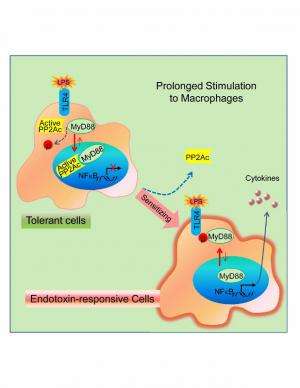Scientists find underlying mechanisms behind chronic inflammation-associated diseases

(Medical Xpress)—Inflammatory response plays a major role in both health protection and disease generation. While the symptoms of disease-related inflammatory response have been know, scientists have not understood the mechanisms that underlie it.
In a paper published in Cell Reports Feb. 21, a team lead by Xian Chen, associate professor of biochemistry and biophysics and member of the UNC Lineberger Comprehensive Cancer Center, mapped the complex interactions of proteins that control inflammation at the molecular level.
The inflammatory response acts as a first line of defense for the immune system. Cytokines are generated to contain infection, preventing the occurrence or spread of diseases, including cancerous tumors. An overproduction or underproduction of these cytokines during disease-related inflammatory responses can lead to a variety of disease such as arthritis, asthma and some kinds of cancer.
The team found that chronic inflammatory response is mediated by the interaction of the protein phosphatase PP2Ac and an adaptor protein of Toll-like receptors (TLRs) MyD88 in a type of the immune cells (macrophages) showing tolerance to persistent stimulation of endotoxin (LPS).
Within endotoxin-tolerized macrophages, "PP2Ac is constitutively activated and operates on a switch that exists to convert pro-inflammatory MyD88 to immunosuppressant MyD88," said Chen.
Studying interactions of the protein network that underlies inflammation, the research team found that PP2Ac disrupts the pro-inflammatory signaling pathway mediated by the complex of MyD88 and TLR4. As a result of this disruption, both constitutively active PP2Ac and MyD88 move within the cellular nucleus, where they bound with the epigenetic machinery and alter the chromatin structure of a class of pro-inflammatory genes that leads to the silencing of this class of the genes.
"In the nucleus, in a MyD88-dependent way constitutively active PP2Ac reprograms the epigenetic machinery," said Chen.
With the discovery of PP2Ac behavior, Chen's research establishes a previously unknown link between cellular signaling and epigenetic regulation, which affects the genetic blueprint of inflammation. By mapping out the signaling pathway, as well the epigenetic machinery targeted by abnormally activated PP2Ac within the cells under chronic inflammation, the research identifies potential targets of immunomodulation for future therapies for inflammation-related disorders and cancers.
"Not only did we identify individual targets, but we also identified those interconnected targets in networks of dynamic protein interactions. That will set up the base for future network medicine, as targets on single genes and targets can have off-target side effects. To increase the precision of the drug targets, we reveal individual proteins but also their interactions as targets," said Chen.
More information: Protein Phosphatase 2A Catalytic Subunit α Plays a MyD88-Dependent, Central Role in the Gene-Specific Regulation of Endotoxin Tolerance. Cell Reports, 2013. DOI: 10.1016/j.celrep.2013.01.029















